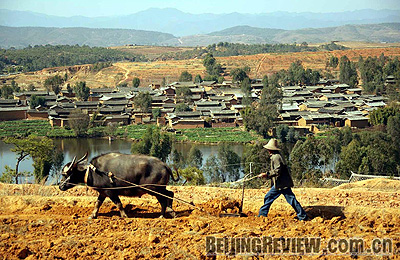| Poverty Line in Question
The World Bank issued a report in early April pointing out that although China has raised the poverty line in 2009, the Chinese Government's poverty relief standard and investment programs are still far below international levels. China still has 254 million people living under the current international poverty line, much more than China's officially estimated 15 million impoverished people in the rural area.
 |
|
CRITERIA IN DOUBT: Despite positive data, China's poverty line falls way short of international levels | The poverty line was raised from the annual per capita income of 785 yuan ($115) at the end of 2008 to its current 1,196 yuan ($176), but it's only half of the World Bank's poverty level of $1.25/day per person. When the poverty line is too low, it will deprive a large impoverished part of the population from poverty relief aid.
Statistics show that the per-capita net income for rural residents in 2008 was 4,716 yuan, and according to the international standard, the poverty line in a country should be 50 percent of its average income. So this calculation means, even in the rural areas, the poverty line should be 2,300 yuan.
China Youth Daily
This Is Not Fine
The Ministry of Public Security recently instructed traffic police to change their modus operandi in regards to law enforcement by reducing fines, increasing education and dumping targets set for accumulating fines over a set period.
It is said that traffic police, and also many other law enforcement departments, deduct a percentage from the fines, making fines an unwritten rule. The Ministry's demand is good news. However, if the root cause of these dubious fines is not resolved, this new approach is unlikely to succeed.
It's not that fines can't be used as a means to punish law breakers, but fines should not be linked to the interests of law enforcers. When the two are connected, fines will only serve law enforcers and not society at large.
Therefore, the ministry's demand to reduce fines will not effectively restrict traffic police's desire to make money from fines. The excuse given by law enforcement departments to make use of the fines is to compensate for operation expenses. This is a groundless excuse. If these departments have insufficient budgets, they should apply for a government fiscal subsidy.
The key to eradicating this "fine-based economy" is to restrict power. All the fines should be paid into one bank account opened by the Central Government, and should not be returned to the law enforcement departments that collect the fines. By no means should we allow the fines to be connected to the personal income of traffic police.
Workers' Daily
Assistance for Moms
At the current stage, China's maternity insurance only covers women with formal jobs, because the premiums must be paid on behalf of individuals rather than by an individual.
Although the childbirth expense is not so high, the expenses for routine health examinations after a woman gets pregnant is no less than 10,000 yuan. Together with the lactation and home-stay period, the expense is quite a huge sum.
It's hoped that more attention can be paid to Chinese women's maternity-related rights. It's strongly proposed that the application for maternity insurance reimbursement can also be conducted in the name of a family. Childbirth and natal care are not only the business of the mother, but also relate to the whole society and the whole nation. It's unfair to deprive the family of access to maternity insurance just because the mother is unemployed.
Beijing News
Danger of Unlicensed Clinics
On March 30, a migrant worker died of intravenous transfusion in an unlicensed clinic. A survey taken of more than 100 migrant workers in Beijing shows that 85 percent of them would prefer unlicensed clinics around their construction sites, just in order to save money.
Although this survey was conducted among migrant construction workers, the difficulty in seeing a doctor for this group is undeniable. If they could afford the medical expenses, they would certainly not use unlicensed clinics.
According to the new medical reform scheme, the government will provide medical services to all citizens. This is good news. But we want to know, will the new scheme enable migrant workers to go to formal hospitals? Will the low-income classes have access to safe and well-priced medical services?
For years, medical resources are concentrated in big cities and big hospitals, resulting in the shortage of these resources in local hospitals. If the new scheme really aims at covering the whole society, the government must input more in the rural and community hospitals. Meanwhile, medical services and medicines should be offered at a much lower price than they are today, so as to eradicate unlicensed clinics and avoid similar tragedies.
Dazhong Daily
| 